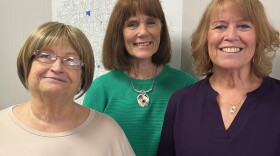Wissa has never been this far from home.
More than 7,000 miles away from his hometown of Jalalabad, a popular song from Afghanistan helps keep him tethered.
The song, called "My Homeland," has become a symbol of solidarity with thousands of Afghans who are fleeing their country amid political turmoil.
"'I left my house, my country.' The meaning of the song is that," Wissa said. "Whenever I hear that song, it makes me cry."
KMUW is only using Wissa's first name in order to protect family members still in Afghanistan.
Afghans represent one of the largest refugee populations in the world. The United Nations estimates nearly 6 million Afghans have been displaced as a result of decades of conflict, violence and persecution in Afghanistan.
Wissa is one of about 400 Afghan refugees who have resettled in Wichita in the last year. The 26-year-old lives here with his parents and younger siblings.
He was working at a bank in Jalalabad when he heard the Taliban had taken over Kabul, as U.S. troops were beginning to withdraw from Afghanistan.
"People were shouting outside," Wissa said. "When we [went] back in … the national army of Afghanistan, they were shouting [at] us, 'Please leave the place because they are coming.'"
Wissa's family fled the crisis with few belongings. They first stopped in Qatar before living in a refugee camp in Germany for 45 days.
From there, his family flew to Philadelphia, moved to Virginia for about a month and finally settled in Wichita.
The group helping Wissa and other Afghan refugees resettle is the International Rescue Committee of Wichita. The relief organization also finds itself in the middle of a move.
Morgan Palace is the resettlement manager for the local IRC. She said it's been a blessing to recently shift to a larger, more convenient location downtown.
"We are closer to the transit center, which is great for our clients, in terms of accessing our services, and our caseworkers and our staff," she said.
About 550 refugees from countries besides Afghanistan are also set to arrive in Wichita between now and the end of September. To help new arrivals settle into Wichita, the group needs volunteers for an array of tasks.
Volunteers can provide transportation, and they can help teach refugees about English and American culture.
Palace said Wichita residents are crucial in helping refugees feel at home.
"The community has absolutely stepped up to help us, in donations, and again, getting volunteers on board and people calling to see what kind of support they can offer," she said.
Since arriving in the United States, Wissa has helped fellow refugees by working as an interpreter. He can speak six languages, including Pashto, Urdu and Hindi.
Wissa attends doctor's appointments, grocery store trips and even job interviews with other refugees.
While he finds the work fulfilling, he plans to start a new career in banking — much like the one he left behind in Jalalabad.
Wissa still hopes he can return home and see his extended relatives again someday. But for now, he said, he's thankful for the people here who are helping secure a future for him and his family.
"All of the people in Kansas, they are so kind," he said. "And they are helping a lot all the Afghans here."
Copyright 2022 KMUW | NPR for Wichita. To see more, visit KMUW | NPR for Wichita. 9(MDA4OTAxNzAzMDEzMjc0MTc2MzA5ZDZlMw004))






